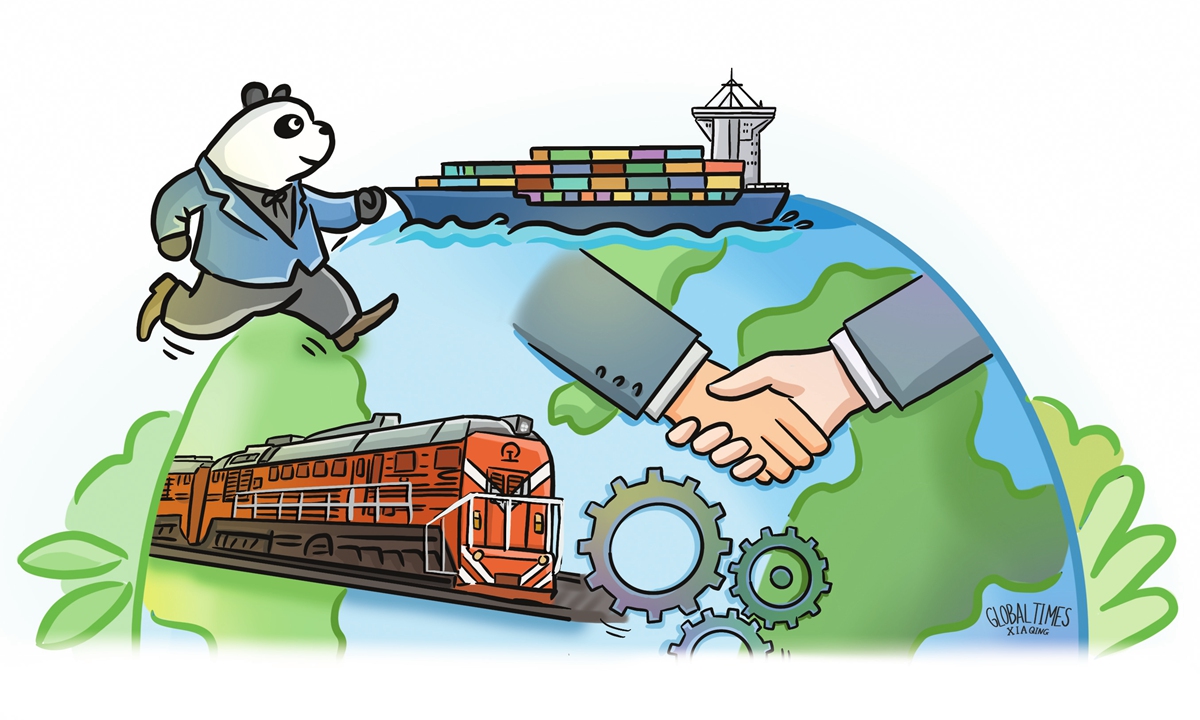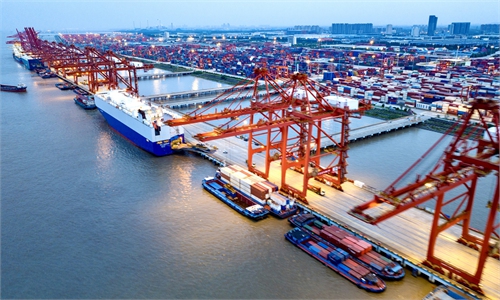
Illustration: Xia Qing/ GT
In 1978, China made the decision to open up and turn outward. This has been fundamental to China's extraordinary economic transformation over the last four decades and more. The turn outward, we should remind ourselves, represented a rejection of the "socialism in one country" thinking that had shaped Chinese policy after the 1949 revolution. The new approach was hugely consequential. China came to see itself as an integral part of the global economy, rather than, as before, a part of the socialist bloc, or, more narrowly even, pretty much on its own. China's new approach was to measure itself against the world, and, more crucially, the advanced economies of the US, Europe, and Japan.
Is China turning inward? If it did, this would represent a huge shift in strategy away from China's landmark decision in 1978. Is there any serious evidence of such a turn? There is on the part of the US, but certainly not by China.
Since 2016, the US has come to regard China not as a partner, but as a grave threat to its position as the global hegemon. In response, the US has sought systematically to exclude China from accessing high-end technology such as semiconductors and AI, while working tirelessly to persuade and require its allies in the EU and East Asia to do the same. As a result, the idea of a single overarching global economy has been seriously weakened; it is becoming increasingly divided and fragmented. In a perverse way, America's shift is a tribute to China's remarkable transformation. America's maxim might now read "If you can't beat them, exclude them." Its determination to wreck the WTO is part of the same playbook. In the face of China's challenge, the US is turning inward and seeking to divide the world and exclude China. Its imposition of 100 percent tariffs on Chinese EVs is a classic example of the follies of this kind of approach, threatening the US' commitment to its climate change targets. The EU is following the same path, having announced similar though less drastic tariffs.
One possible Chinese response would be to take a similar approach, leading to a tit-for-tat downward spiral that would threaten to fracture the global economy. China regards trade as crucial both for its own well-being and that of the global economy, promoting global connectivity and win-win cooperation. It is committed to global competition and cooperation rather than protectionism. The Chinese economy is far more dependent on exports than America's. Its exports to both the US and Europe remain strong. China is unlikely to follow the US or the EU down such a path.
There is another dimension to China's outward mentality which has become increasingly important over the last decade. China's largest single external market is now ASEAN, which imports more from China than either the EU or the US, in that order. More broadly, China's trade with the developing world has grown apace, a trend boosted by the Belt and Road Initiative over the last decade. China's outward reach and commitment, thus, cannot be measured solely in terms of its trading relationship with the US and the EU, given the growing importance of the developing world. The latter is likely to play an increasingly prominent role in China's overall trade.
It will not, however, replace that of the US and the EU. They occupy different positions in China's pattern of trade. As an increasingly high-end economy, China needs to trade with the US and Europe. China requires their high-end products. Notwithstanding its growing emphasis on innovation, China will never be able to meet all its own needs. A global division of labor is an intrinsic aspect of high-end production, as exemplified in semiconductors by the US' dependence on the Netherlands and the Taiwan island. China also requires the West's high-end products because it needs to benchmark its own products against them, a crucial factor in the learning process. China has zero interest in decoupling itself from the US and Europe.
China's vision of the future is not a bifurcated world. On the contrary, it is committed to one world and one global economy. This will provide by far the best conditions for its own development and that of the global economy more generally. Notwithstanding the increasingly divisive attitude of the US, China will continue to promote an open global economic order. Alas, the outlook promises to get worse rather than better. A Trump presidency, for example, is likely to increase protectionist and isolationist trends in the US. In response, the Chinese will have to find the best way of defending its own interests. The dispute with the EU over tariffs on Chinese EVs might yet offer a deal that is acceptable to all sides in which cheaper and superior Chinese EVs have access to the EU market at reasonable tariffs, European carmakers have continued access to the Chinese market, and the European car industry survives reasonably intact.
The author is a visiting professor at the Institute of Modern International Relations at Tsinghua University and a senior fellow at the China Institute, Fudan University. Follow him on X @martjacques. opinion@globaltimes.com.cn



